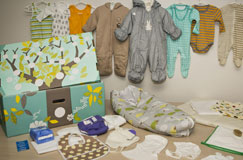South African fathers develop baby 'survival kit'
30 April 2014
Two South African fathers have adapted a 1930s Finnish design to come up with a box
aimed at supporting South African mothers with newborns.
The Thula Baba Box will be made out of plastic and will include essential items, such
as clothes, sheets, nappies, health products, and toys. The box itself can double up as
a cot, a bath or be used to safely store items.
Crucially, the box will also contain information targeted at mothers, as well as
incentives to encourage expectant mothers to visit antenatal clinics earlier and more
frequently.
The project is being driven by De Villiers, a marketing executive, and Hertzog,
founder of Action Hero Ventures, a "very early-stage angel fund" based in
Stellenbosch that invests in creative and technology start-ups.
The pair, who are both fathers, say the box aims to improve the overall wellness of
mothers and babies.
'Amazing example'
The concept is
based on a 1938 initiative by the Finnish government that supplied
expectant mothers with a similar box. The box is credited with helping to decrease
Finland's infant mortality rate from 65 deaths for each 1 000 children born in 1938 to
3 deaths per 1 000 births in 2013, Action Hero Ventures say on their website.
"We thought the Finnish box was an amazing example of design that changed a
nation," said Hertzog. "We hope that, given some tweaks, our product will have just
as much of an impact."
The project is being run in partnership with the Western Cape Government
Department of Health, the Department of Economics at Stellenbosch University, and
the J-PAL Africa Incubation Fund, which has provided funding.
"We are looking forward to seeing the impact of the study [by health economists at
Stellenbosch University] on lower-income families in the Western Cape," De Villiers
said.
Potential
It is expected that the box will be
distributed to mothers throughout the Western Cape
by 2016 and to the rest of South Africa by 2020.
The project has been selected as an official 2014 World Design Capital Cape Town
project.
"We find it encouraging that two fathers are proactively engaged in a collaborative
initiative to improve the lives of both babies and mothers in the Western Cape,"
Tracey Naledi, chief director of health programmes, said. "We encourage such
initiatives that are particularly aimed to support the first 1 000 days of life, and are
excited to see the results of the study."
Ronelle Burger at Stellenbosch University's Department of Economics, said the project
had great potential to improve the lives of mothers and babies as it not only
distributed products and information, but also offered incentives to change behaviour.
"Similar schemes have been successful in promoting health in other countries and we
that this study will provide useful inputs for policy
making, but also contribute to
ongoing international research on the role that incentives can play in promoting better
health choices," Burger said.
SAinfo reporter and World Design Capital
 The Finnish baby box, on which the South African Thula Baba Box is based. (Photo: World Design Capital 2014)
The Finnish baby box, on which the South African Thula Baba Box is based. (Photo: World Design Capital 2014)




